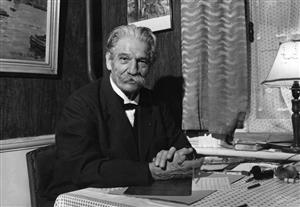-

Brief History of Albert Schweitzer(Rewritten from program at the Dedication of Albert Schweitzer Elementary School on May 18, 1960)Dr. Albert Schweitzer contributed to his century a life comprising a number of brilliant careers superimposed upon one another. Distinguished as a theologian, philosopher, teacher and musician, in mid-life he diverted his capacities into still another channel - medical doctor administering to the needs of natives in Africa.Dr. Schweitzer was born on January 14, 1875 in Kaysersberg, Upper Alsace, Germany (which is now France.) In 1893, Schweitzer began studies at the University of Strasbourg which let to doctorates in Philosophy and Theology. During this period he also studied at the Sorbonne, took organ lessons from Charles Widor in Paris, and attended the University of Berlin.On his thirtieth birthday in 1905, Schweitzer decided to devote the rest of his life serving as a missionary surgeon. He commenced medical studies which continued through 1913, when he sailed to Africa and established a hospital on the grounds of the Lambarene station of the Paris Missionary Society in Gabon, French Equatorial Africa.With the outbreak of war, he was interned as an enemy alien and returned to France. For several years after the war he lectured and delivered concerts throughout much of Europe, preparing for a second sojourn in Africa.In 1924, Dr. Schweitzer re-established his hospital, which he soon was forced to enlarge both in facilities and staff. The remainder of Dr. Schweitzer's life was spent at Lambarene except for frequent visits to Europe for lectures and writing, and a visit to the United States in 1949.The 1952 Nobel Peace Prize was awarded to Dr. Schweitzer and he had received honorary degrees from many distinguished universities in Europe and America. His literary career carried him through much research and he contributed a two-volume "Philosophy of Civilization" and "Christianity and Religions of the World." As a foremost interpreter of organ music, Dr. Schweitzer recorded much of Bach's work and wrote extensively on Bach, organ music and organ building.Albert Schweitzer died in Lambarene on September 4, 1965.

